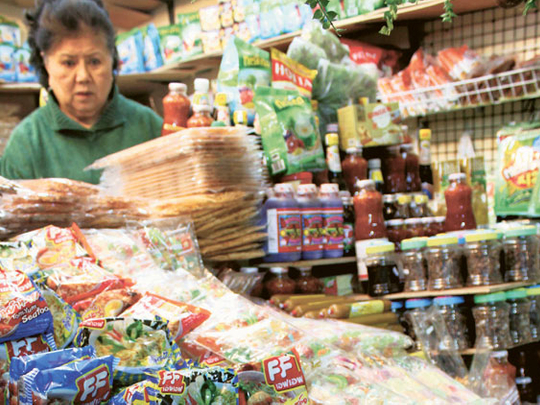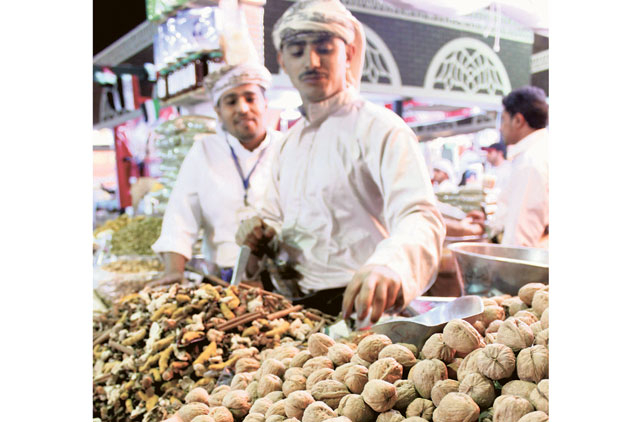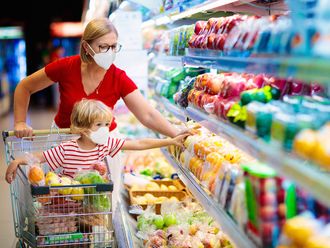
Dubai: "Here, try a sample," the Arab shopkeeper calls out, dipping a plastic teaspoon into a vat of golden honey. "This one is the best honey… good for the heart."
‘Sider honey', the label on the vat says. Nearby is another one curiously labelled: ‘Only for married'.
The shopkeeper catches my smirk. He is about to explain, but is interrupted by another customer who orders a jar. Two more approach the stall. "Business is good," he tells me.
At the Global Village a different kind of shopping has taken over this year. With more food products on sale, consumers are spoilt for choice when it comes to shopping for the palate.
At the Saudi Arabia pavilion, the honey stall is a popular stop. Shopkeeper Abdul Razzaq Al Rabee'a says the all-natural honey is in demand. He sells more than 20 varieties, but the more popular of them is cider honey, chuka honey to cure coughs and sore throat, and there is one for diabetics.
There's also that peculiar honey "only for married" which Al Rabee'a claims improves stamina. What's in it? He just grins in reply.
Spain
At the Spanish pavilion, the alcohol-free sangria is drawing big crowds.
If you come asking for it in the evening, stocks will most probably be sold out, Samar Al Masri, says marketing manager of Al Andalus Foods, which is retailing it for Dh30 a bottle. Other fast-selling items include seafood ketchup, and a variety of Spanish crackers and powdered drinks.
Palestine
At the Palestine pavilion, entrepreneur Hamze Umm Hamza is continuing his mother's legacy of making and selling home-made labneh (soft cheese made from yoghurt) and other Palestinian food products.
There are varieties with zaatar (a blend of herbs, sesame and salt), mint, eggplant, chilli and cheese, all with a generous drizzle of fresh olive oil.
He has been participating in the Global Village for ten years, Umm Hamza says. "There are competitors, but we've outlasted many of them. People come back to us because they know that we don't cheat them."
Thailand
There's a street market feel when you visit the Thai pavilion, especially at the Somjit shop where piles and piles of dried delicacies — from seafood to fruit — are on sale. The 70-year-old owner Somjit Bunkal travels from Thailand to the UAE just to manage her stall at the fair.
Behind the stall, look out for the chef in black and aviator glasses. He cooks up a mean tom yum soup at the Tom Yam Kung food stall. It's just the right mix of spicy and sour, with a generous serving of shrimp. It is simply street food delight.
Tunisia
Business is just picking up at shop No 5 at the Tunisian pavilion. It's their first time to join the fair, says Lotfi Bin Hafsa, the shopkeeper. "People are starting to come in, and we are trying to introduce Tunisian products to them," Bin Hafsa says. Tunisian food has been described as a blend of the best of the Mediterranean and the spice of the Middle East, but you can find out for yourself with a sampling or two of their products.
The halawa taninia — made of sesame seed paste and sugar and shaped into blocks — is a must-try. Or grab a can of harissa (spiced chilli).
Morocco
For a taste of Morocco, try the pickled fruits at the Bab Marrakech stall. The pickled lemon, or preserved lemon, which is a key ingredient in many Moroccan dishes, goes for Dh50 per kilo. There are also pickled olives (normal and spicy varieties) for Dh40 per kilo. Then wash them down with Moroccan mint tea.
Philippines
Filipino street food staples are aplenty at the Turo Turo stall at the Philippine pavilion. There's turon (deep fried banana and jackfruit rolled in spring roll wrapper), kutsinta (brown rice cake), calamares (fried squid in batter) and fish ball.
Syria
At the entrance to the Syrian pavilion you will spot the cart where entrepreneur Abu Haitham peddles Syrian sweets. The most popular, he says, is his box of Syrian chewing gum.
The gum comes in peppermint, fruit and mastic flavours. There is also a variety of jelly candies for Dh5 and biscuits for Dh10. And while you are shopping, expect the friendly Syrian tea boy to offer you a cuppa.
Lebanon
There are many shops offering jams of various kinds at the Lebanese pavilion. There's rose, mulberry and fig varieties for Dh14 per bottle. Of course, don't step out without Lebanon's famous pastry called the baklawa, which is made of layers of paper-thin dough with a filling of crushed nuts and sugar.
Egypt
A stall at the Egypt pavilion offers something simple yet sweet: boiled sweet potatoes for Dh10. Top it with your choice of dried raisins, coconut, honey or pepper powder.
Yemen
Buy an assortment of nuts such as almonds, pistachio or walnuts at the Sana'a Yemen Centre for Spices and Yemen Coffee for Dh30 per kilo. You can also get sesame oil and Yemeni coffee beans.
Bahrain
Get an assortment of Bahraini sweets and biscuits for Dh35 per box. There's halwa hashab, maoul, rahash nashab, zalabiya, garaiba and rangeena.
Jordan
Move to the Jordan pavilion and get fresh zaatar and olive for Dh60 per kilo at the Nasser Shop. They also offer pickled products.












